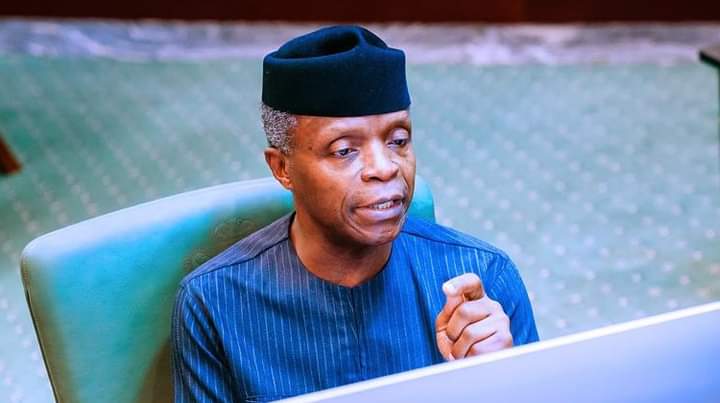
Vice President Yemi Osinbajo has called on the United States (U.S.) to reset its foreign policy on Africa.
According to him, a robust intervention in the continent by the U.S will be beneficial to both parties.
Osinbajo made the call in a speech delivered virtually at the 2021 Johns Hopkins University’s African Studies Programme Conference on the theme: “Africa-US re-engagement: A new foreign policy agenda”.
He urged the U.S. to back the call for a just global transition to zero emissions, lead the effort to ensure easy access to COVID-19 vaccine.
The vice president said: “The U.S.) should promote a partnership that brings about economic prosperity, increases security, combats disease, improves governance and mitigates climate change.
“Africa is in many ways the last frontier for economic development and it has the potential to be a global growth pole. Indeed, as other parts of the world are looking inwards, Africa is moving confidently to integrate its economies through the African Union Agenda 2063 as well as the establishment of the African Continental Free Trade Area (AfCFTA).”
Speaking on AfCFTA implementation, Osinbajo said: “The United States is well placed to lead trade and investment ties with Africa. And it has a good leg-in with the African Growth and Opportunities Act (AGOA). The legislation, which removed all tariffs on 6,400 products available for export to the US, saw some African countries benefiting considerably.”
”As the African Continental Free Trade Agreements are set to kick-in, AGOA must now be implemented consistent with the AFCTA. AGOA expires in 2025. But a new and improved AGOA that takes these challenges into account can be negotiated before then.”
On improving the support of the US in combating terrorism in the Sahel region, the vice president said a more robust intervention towards clearing the reign of terror in the region is desirable.
He said: “While it is evident that the threat of violent extremist organizations is growing, it will appear that US policy (United States Africa Command) has since 2020 shifted from a strategy of degrading violent extremist organisations in West Africa to simply containing their spread.
“The escalation of the attacks, the synergies being created amongst these extremist groups call for a review of position. It may be the moment for a more robust intervention along the lines of US-backed operations in clearing terrorists and insurgents in the Middle East.”
The vice president also advocated that the US-Africa relations need not be unidimensional, noting that “since the U.S. is also a global leader in economic and military terms as well as through its contributions to the norms that shape the global order, it should work with Africa either under the auspices of the African Union or indeed through individual countries like Nigeria to build a better world.
“Africa should not be seen or used as a pawn in great power games nor as an arena in the contest to secure strategic minerals and natural resources but rather as a partner in building a more secure, peaceful and prosperous world,” Osinbajo added.
In a statement by his Senior Special Assistant on Media and Publicity, Mr Laolu Akande, the vice president also tasked the US to reset its foreign policy with the African continent in ways that bring about economic prosperity, increased security, and improved governance.
The statement reads: “The U.S. and Africa should work together to tackle climate change and moderate global warming including through an energy transition from fossil fuels to renewable energies. African countries have made commitments in this regard towards implementing the Paris Climate Change Agreement targets.
“Given the long term commitment to net-zero emissions by 2050, there is a growing trend among development finance institutions to withdraw from fossil fuel investment, including the World Bank’s decision to cease funding for upstream oil and gas development and the new restrictions on financing downstream gas development currently being considered by the European Union, the United Kingdom of Great Britain and Northern Ireland, and the U.S.
“While well-intentioned, this move does not take into account the principles of common but differentiated responsibility and leaving no one behind, that are enshrined into global treaties around sustainable development and climate action,” Osinbajo noted.












